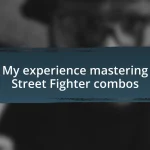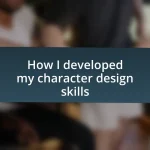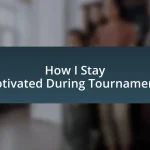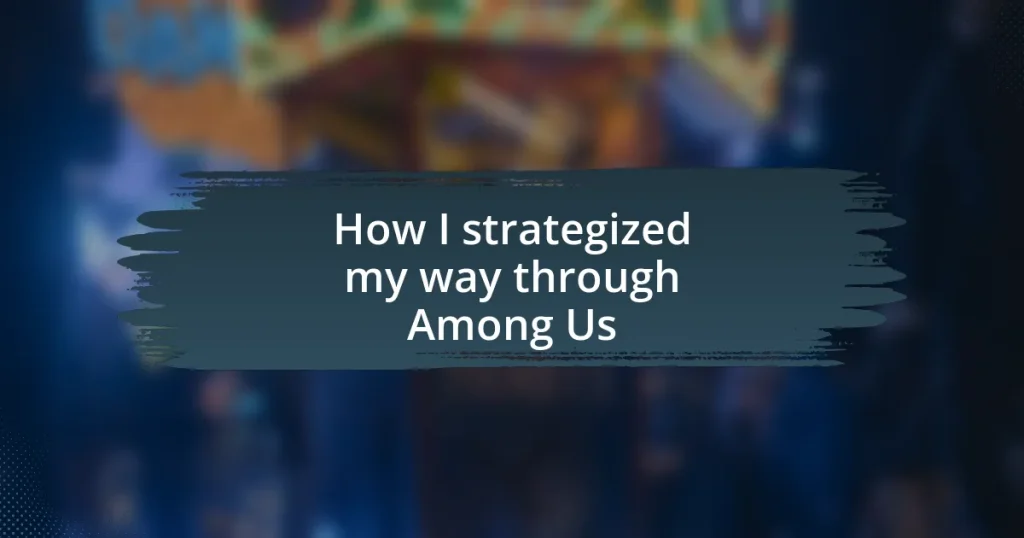Key takeaways:
- Trust and communication are vital for crewmates; articulate discussions can sway opinions and build rapport.
- Developing a winning mindset involves staying calm under pressure, being adaptable in strategies, and viewing failures as learning opportunities.
- Effective deception techniques include engaging players with direct questions and using storytelling to create alibis, alongside careful management of body language.
- Continuous improvement comes from adapting to new player behaviors, learning from mistakes, and collaborating with peers to refine strategies.
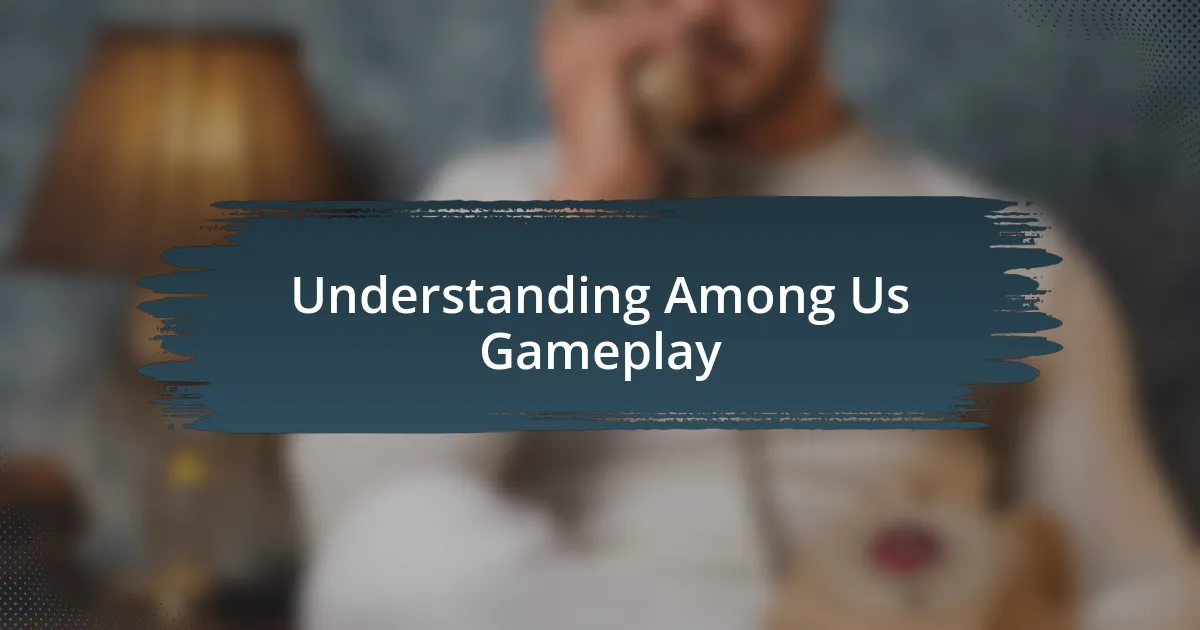
Understanding Among Us Gameplay
Understanding the dynamics of Among Us requires more than just knowledge of the game’s mechanics. I remember the first time I played; I naively thought the colorful graphics and cute characters masked the intense strategy involved. It hit me hard when I was voted out simply because I hadn’t built enough rapport with my fellow crewmates—trust is an invaluable currency here.
One key aspect of gameplay revolves around communication. Have you ever found yourself in a heated discussion during an emergency meeting, trying to convince others of your innocence? I’ve been there countless times, and I’ve realized that being articulate and calm often sways opinions more than just shouting out accusations. I’ve seen players who quietly listen and gather information ending up more persuasive than those who jump in too hastily.
As the rounds progress, I’ve noticed that the game’s tension ramps up significantly, especially when I realize I’m one of the last crewmates left. You can feel the adrenaline pumping as you race to complete tasks while keeping an eye on potential impostors. What strategies have worked for you in these nail-biting moments? Personally, I’ve found that staying aware of others’ movements can unveil hidden motives, which can be a real game-changer.
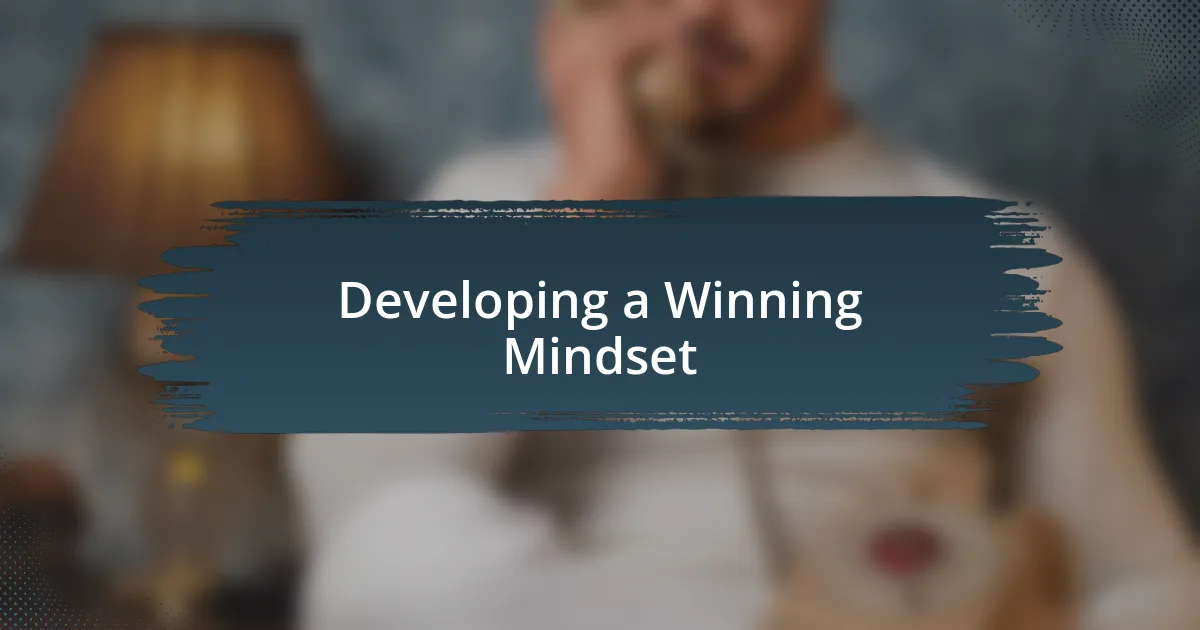
Developing a Winning Mindset
Developing a winning mindset in Among Us goes beyond mere gameplay tactics; it’s about cultivating a mental edge. I recall a memorable match where I felt overwhelmed by the pressure of being the impostor. Instead of letting anxiety take over, I shifted my focus to my opponents, analyzing their behavior to find weaknesses I could exploit. This shift in mindset made all the difference—I started to view challenges as opportunities to outsmart rather than obstacles to fear.
Here are some key principles to foster a winning mindset:
- Stay Calm Under Pressure: I’ve learned that a composed demeanor can be your greatest ally. When you maintain your cool, you’re better able to strategize and respond to unexpected situations.
- Embrace Adaptability: Each round can unfold differently; I’ve often had to pivot my approach mid-game based on players’ tactics. Flexibility can reflect cunning strategy and give you the upper hand.
- Cultivate a Learning Attitude: Every game presents a wealth of lessons. I now take each loss as a learning experience, analyzing what went wrong and refining my approach for next time.
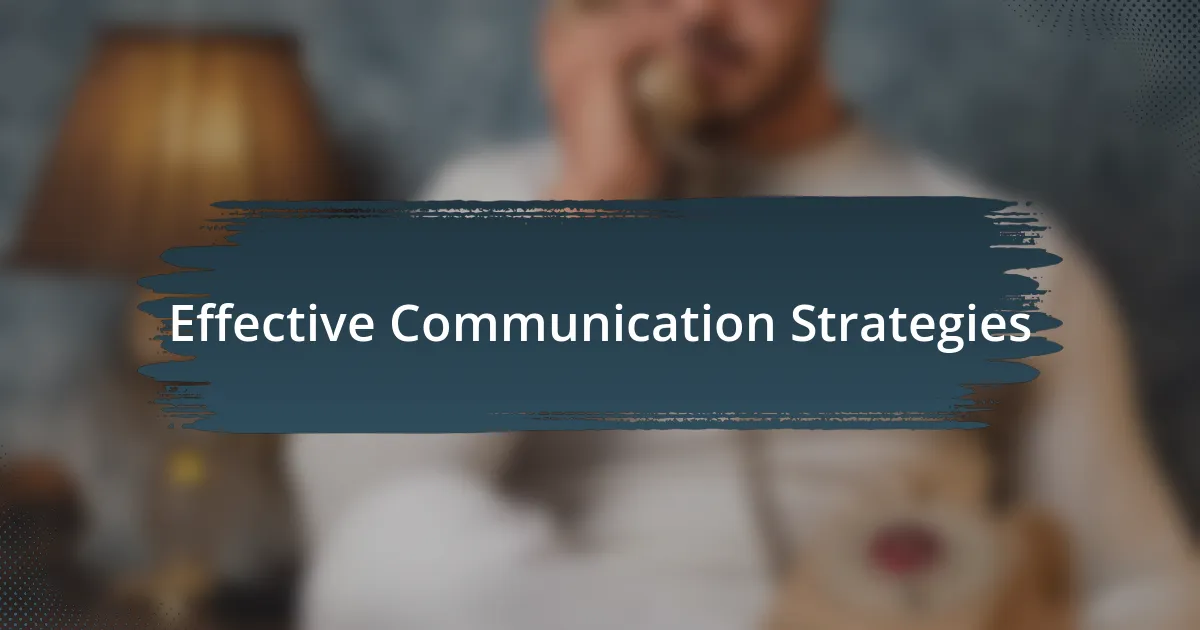
Effective Communication Strategies
Effective communication in Among Us is crucial for both impostors and crewmates. I remember a game where I noticed how effective my team became when we discussed our suspicions openly. By sharing thoughts and asking questions, we built trust among ourselves, making it harder for the impostor to manipulate our group.
One key strategy I found effective is to use direct communication to ask pointed questions. For instance, instead of vague accusations, I began addressing specific players about their whereabouts. This not only clarified the situation but also made other players more confident in sharing their own information. When I focused on what others said, it created a dialogue that made deception harder.
Lastly, employing humor can diffuse tension and keep discussions light, especially when emotions run high after a sudden death. I experienced moments when a well-timed joke lifted the mood, allowing everyone to refocus and think clearly. Keeping communication friendly and relaxed encourages honest sharing, vital for identifying the impostor.
| Strategy | Description |
|---|---|
| Direct Questions | Engaging players with specific inquiries promotes transparency. |
| Group Discussions | Sharing suspicions openly builds trust among team members. |
| Humor | Using lighthearted comments eases tension and fosters open dialogue. |
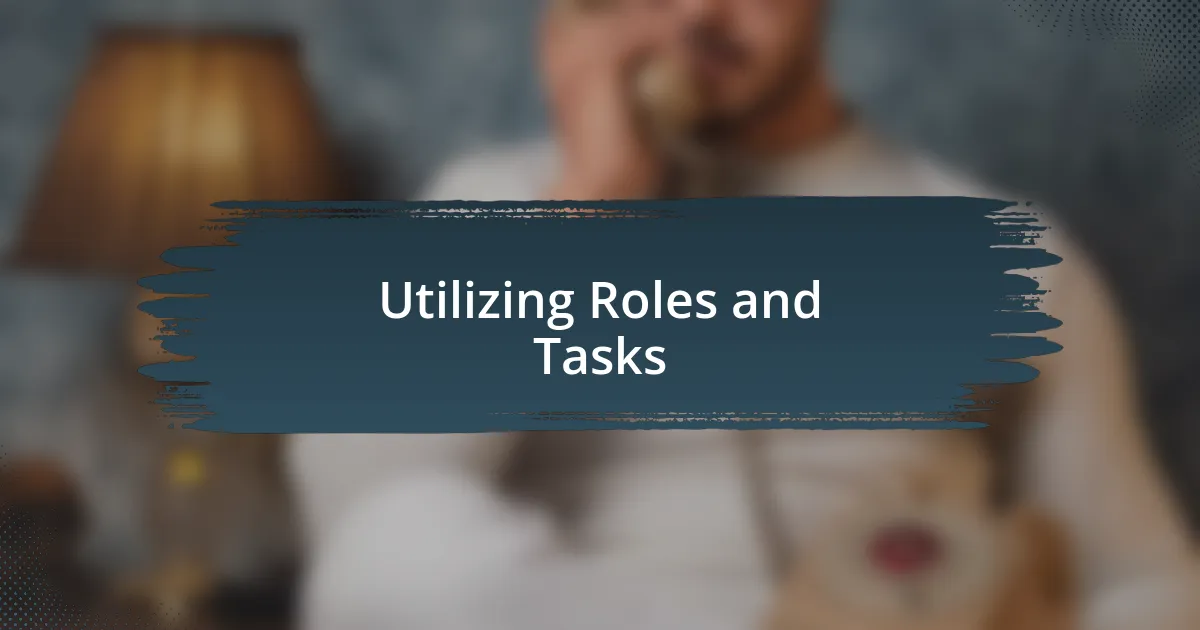
Utilizing Roles and Tasks
Utilizing roles effectively in Among Us can significantly influence the game’s outcome. As I immersed myself in different roles, I discovered that each had unique tasks that could help shape the narrative. For instance, when I played as a crewmate specifically tasked with monitoring the security cameras, I felt a rush of responsibility. I couldn’t just focus on my tasks anymore; I had to observe others closely. This focus not only kept my eyes glued to the screen but also allowed me to gather essential information to share during discussions.
On the flip side, when I took on the role of impostor, I realized that utilizing my tasks as a cover was vital for my success. Performing fake tasks convincingly required me to remember their locations and the patterns that came with them. I distinctly recall one game where I pretended to swipe my card in admin while secretly plotting my next move. The thrill of balancing deceit and participation became my strategy. Wouldn’t you agree that that dance between truth and deception adds an exhilarating layer to the gameplay?
Throughout my experiences, I’ve learned how essential it is to communicate the status of our assigned tasks. I remember a moment when, during a heated discussion, a crewmate shared their completed tasks. It sparked trust and stirred a group effort to keep track of what needed to be done. I began to realize that by openly acknowledging our roles, we could sidestep confusion and make informed decisions together. Isn’t it rewarding to see how these strategic choices can shift the dynamics of the game?
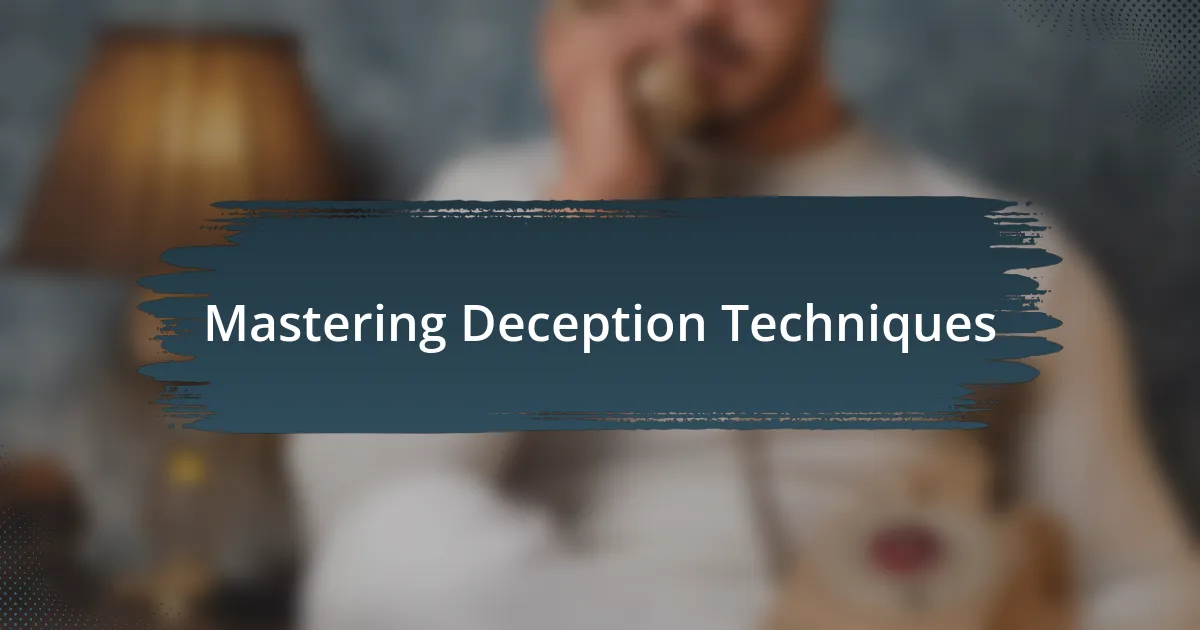
Mastering Deception Techniques
Mastering deception in Among Us requires a delicate balance between confidence and subtlety. When I first began to embrace my role as an impostor, I found that genuine conversation with other players was crucial. I would often throw in small, spontaneous questions about their tasks, gauging their reactions while deflecting any suspicion onto others. Isn’t it fascinating how a simple question can redirect attention and create an air of innocence?
Another effective technique I employed was embellishing my storytelling during discussions. I vividly recall a match where I fabricated a tale about being chased by a potential impostor while electrical was being sabotaged. The adrenaline coursed through me as I described every detail, using animated gestures to enhance my alibi. Watching my fellow crewmates nod and buy into my story was both thrilling and a bit unnerving. It made me realize how much power a well-crafted narrative can have—who wouldn’t feel intrigued by a suspenseful retelling?
Additionally, leveraging body language proved essential in my strategy to master deception. I remember a game where I deliberately altered my movement patterns; I would appear to complete tasks, then linger in a corner, waiting for the perfect moment to strike. Players often evaluate actions based on visual cues, and I learned that being aware of how I was perceived became another layer of my strategy. Have you ever paused to consider how much unspoken communication occurs in a game where words often carry the weight of deception?
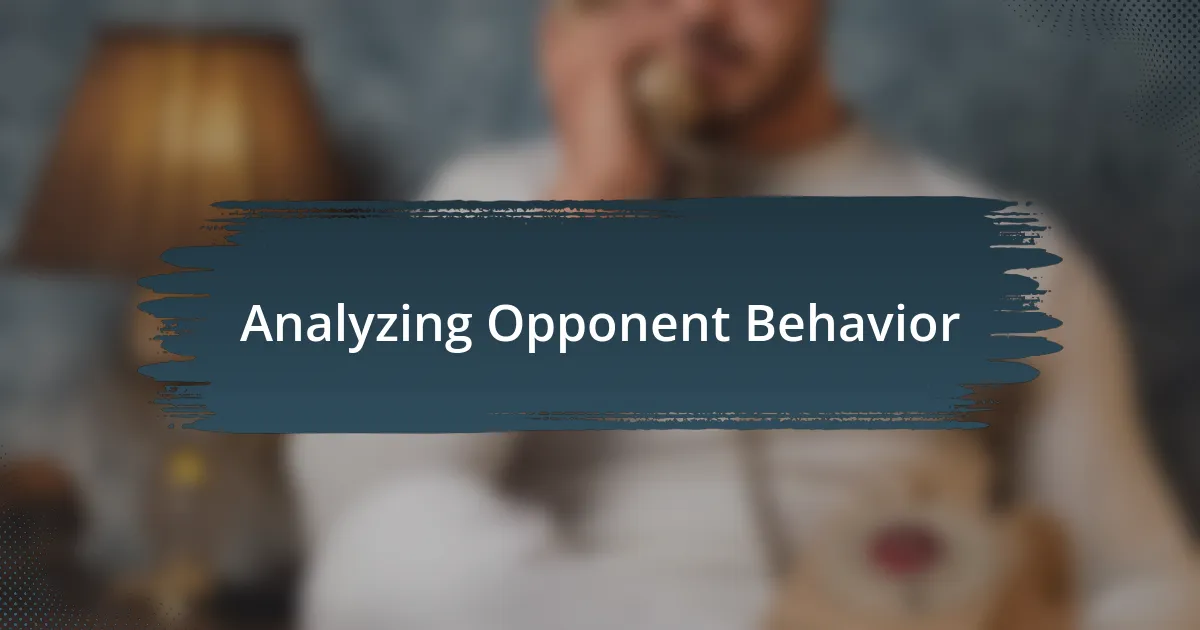
Analyzing Opponent Behavior
Analyzing opponent behavior in Among Us is like playing a psychological game of chess. I became adept at watching for patterns in how players interacted—who teamed up, who remained silent, and who often diverted the conversation. This level of observation helped me make connections about players’ tendencies. For instance, I distinctly remember a match where a normally talkative friend suddenly went quiet after a body was reported. That silence screamed volumes, leading me to suspect their involvement.
During my games, I also took note of the subtle shifts in body language and tone among my opponents. I recall a specific instance when a player’s voice wavered just slightly during a tense discussion about who the impostor might be. That tiny inflection triggered my instinct to dig deeper. Have you ever felt the weight of doubt in someone’s tone? It’s those nuances that can often reveal more than words alone.
Another critical aspect I considered was the emotional state of my opponents. I learned that some players react defensively when pressured, while others may become overly aggressive. In one memorable game, a player who was cornered by too many questions snapped, leading me to believe they were hiding something. It’s intriguing how stress can distort a player’s typical behavior, right? Recognizing these emotional cues became a key part of my strategy, guiding me in deciding when to accuse and when to remain silent.
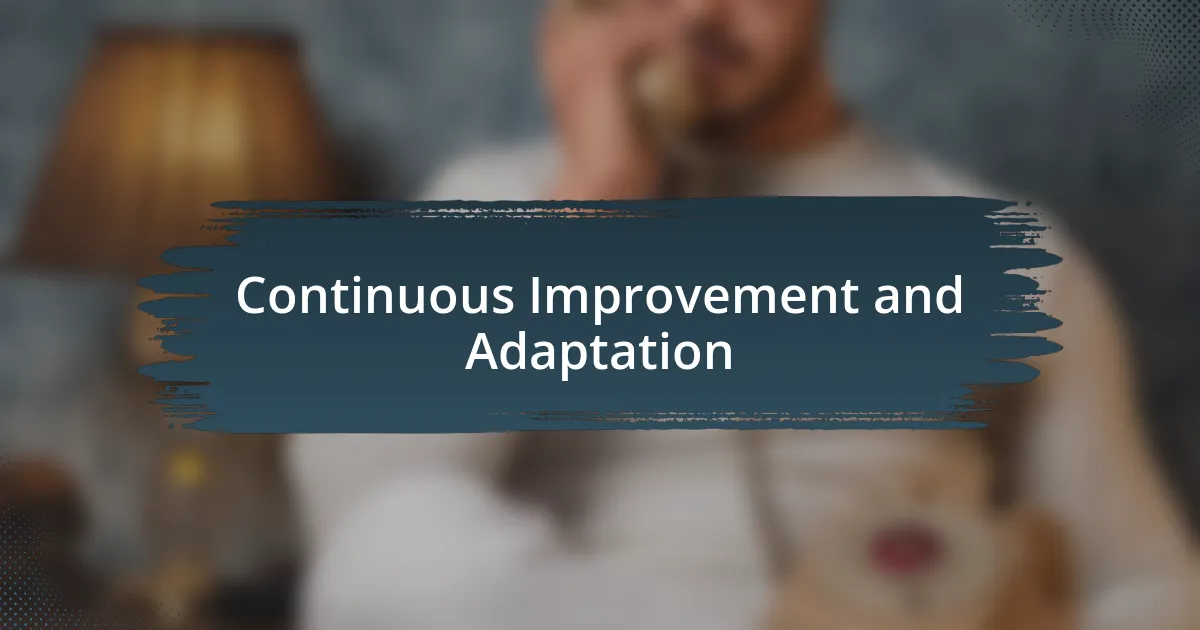
Continuous Improvement and Adaptation
Continuous improvement in Among Us has always required me to stay flexible and adapt to new strategies and player behaviors. Each game is a fresh opportunity to refine my approach. I remember one evening when a group of friends decided to mix it up by using deceptive communication tactics. Instead of the typical accusations, they would often play innocent, which forced me to rethink my usual game plan. I realized that to thrive, I must be willing to change my methods constantly, tailoring my responses based on what others were doing.
Adapting my strategy also meant embracing failure as a valuable learning experience. I vividly recall a match where I jumped too quickly to accuse someone based on a gut feeling. The tables turned, and I ended up being voted out! What an unexpected lesson that was! It taught me the importance of not only observing others but also reflecting on my missteps. Understanding and learning from those moments truly shaped my gameplay.
As I honed my skills, I started incorporating feedback from my peers. After a game, we would often discuss different tactics—what worked and what didn’t. This collective brainstorming opened my eyes to new perspectives. It’s amazing how collaboration can enhance personal growth. Have you ever thought about how sharing experiences can accelerate improvement? In my case, it opened doors to strategies I would have never considered on my own.

